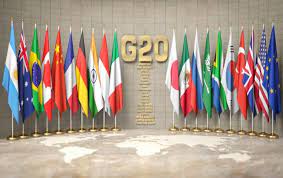In an exclusive interview with Akashvani Correspondent Bhupinder Singh, Union Minister of State for External Affairs, V Muralidharan, shared insights into India's upcoming G20 Presidency and its pivotal role in shaping global agendas. The interview provided a glimpse into India's commitment to making G20 a people-centric and globally inclusive platform.
Minister V Muralidharan began by highlighting that India's G20 Presidency differs significantly from previous iterations. It has evolved from a pure diplomatic exercise into a people's movement. The government's emphasis on Jan Bhagidari, or public participation, led to G20 events being held across over 50 destinations in India, involving more than 45 lakh people. This year's G20 is truly a people's G20, making the common Indian citizen an integral part of the discussions.
India's priorities within the G20 framework are centered on the core principles of the "4D" approach: advancing decarbonization, digitalization, ensuring equitable development, and de-escalating conflicts. These principles aim to address global challenges comprehensively.
Minister V Muralidharan emphasized the need to bring new perspectives to the G20. India sought to make G20 more inclusive by reflecting the views of the world and the concerns of the Global South. The discussions span a wide range of topics, from climate change to inclusive development and technology advancement.
To foster agreement and cooperation among G20 member nations in realizing these objectives, Minister V Muralidharan outlined a multifaceted approach. India has initiated efforts to mitigate the effects of climate change through initiatives like the International Solar Alliance and the Coalition for Disaster Resilient Infrastructure. Simultaneously, India is working towards a multipolar world where each nation has a role to play.
India sees the G20 Summit as an opportunity to showcase itself as a prime investment destination. The extensive G20 events across the country have allowed the world to witness India's progress, infrastructure, and technological advancements. Recent domestic decisions, such as reducing compliance burdens and decriminalizing minor offenses, make India an attractive destination for foreign investments. This influx of investments is expected to contribute significantly to India's target of becoming a $5 trillion economy in the coming years.
India is working towards solidifying migration and mobility partnerships with numerous nations. These initiatives aim to ensure the social security and overall well-being of Indian workers and professionals abroad. The slogan "Prashikshit Jaye, Surakshit Jaye" (Go Safe, Go Trained) signifies India's commitment to safe and secure migration.
India has signed agreements with various nations to facilitate transactions in domestic currencies, promoting global engagement in Indian Rupee transactions. Additionally, India's UPI (Unified Payments Interface) plays a crucial role in this context. Trade in local currencies is gaining momentum, and India's digital platforms, especially UPI, are being integrated with platforms in partner countries. These initiatives aim to remove time lags and technical hurdles in financial transactions, thereby facilitating and boosting bilateral trade.


